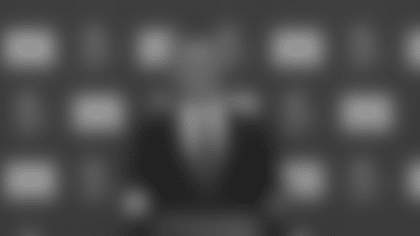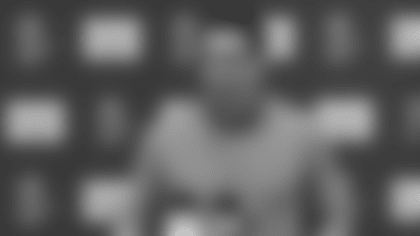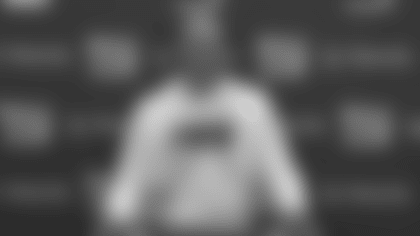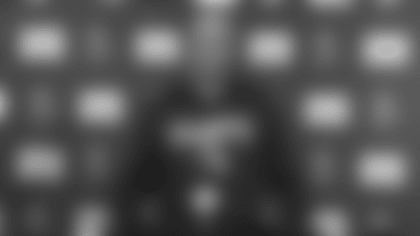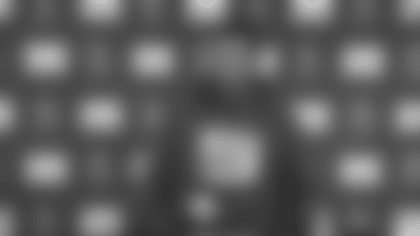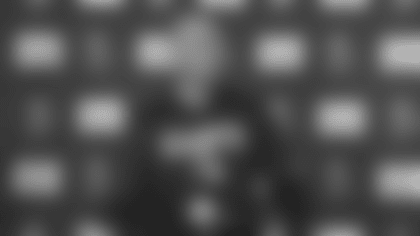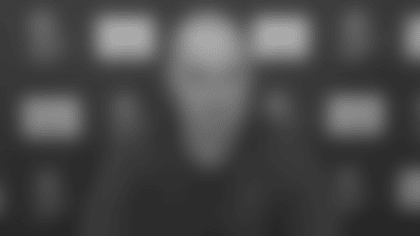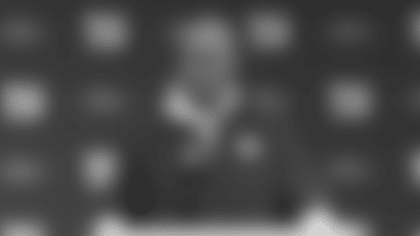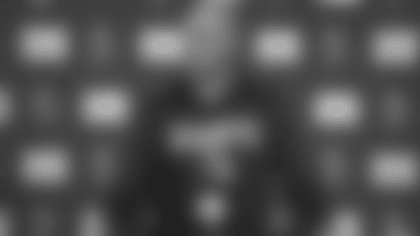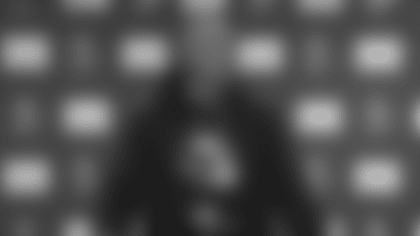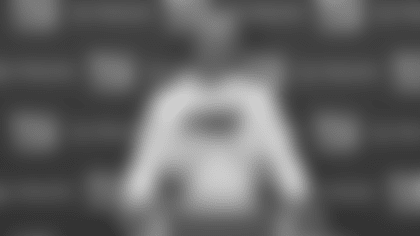Head Coach Brian Daboll
Good to be back out here today. Really an extension of OTAs for us. We have an extra walkthrough and some extra meetings after practice, but relative to our practice and how we're doing things, it'll be very similar as to what we've done the last couple weeks. So, good to be out there.
Relative to, I know you'll probably ask a couple (running back) Saquon (Barkley) questions, my position hasn't changed on that from a couple of weeks ago. Every conversation that I have about Saquon will be private.
Q: Saquon seems frustrated that he feels like details of the negotiations were leaked and were misleading. Is that a concern on your end that he feels that way about the negotiations that are supposed to be private?
A: Yeah, everything that I have to say about Saquon will remain private.
Q: Is everybody here?
A: Everybody except Saquon, but he didn't sign his tag yet.
Q: When you make your plans for the future, for the season, are you planning as if he's going to be there?
A: I'm just planning for today. Have a good practice.
Q: But you obviously have to do roster construction.
A: I'm just worried about today right now.
Q: Because he's so important to the team, can something like that become a distraction eventually from your experience as a coach?
A: I'm just focused on today.
Q: You mentioned that this is a continuation of the teaching, but at this point, are you looking for maybe more execution, alignment? What are you looking for exactly?
A: Yeah. So, we're adding some more things. Today, we'll do some more team periods but with their helmets off, we'll do some short yardage, some goal line and introduce some more things. Keep increasing the installation, and then go out there and have some call-it periods, albeit 7-on-7 where the coordinators are just calling the plays, there's no scripts. Try to build on our communication, our fundamentals and keep on stacking days together.
Q: Do you have pretty much everything installed at this point or is there stuff you're holding back for training camp?
A: I'd say we have a lot. Not everything, but a lot. Today with the short yardage and goal line, it's hard to do, but we can do it with the helmets off and make it a teaching pace but install those things. We can do some situational football today, separate from one another, but last plays and things like that. We're getting close to having everything in.
Q: Is there anything tangible that you've seen in terms of (quarterback) Daniel (Jones) from one year to the next year during this period?
A: Well, I'd just say that he's got much more comfort level with our offense. Again, we've added I'd say considerably new things these camps just to see how they look. But he's got really good give-and-take with (offensive coordinator Mike) Kafka, seeing how different players look in different spots. He's had a really good camp.
Q: How do you judge a really good camp?
A: He's made right reads, he's had good leadership, he's communicating well, he's good in the meetings. All the things that we ask him to do right now during this time of year, he's done a good job with.
Q: I know you're coaching everybody here, but as far as Daniel goes, a lot of time last year was spent getting to know guys. When you know your quarterback, how much does that comfort level from your perspective help grow things moving forward?
A: Yeah, I think it's just like any relationship. Year One, you're getting to feel each other out. Year Two, hopefully you can build on the things that you've—what makes him tick, what makes me tick, what frustrates me, what frustrates him, plays he likes, plays he doesn't like. I mean, it's good communication. He's a very good communicator. We have open dialogue – not just me, but him and Kafka, him and (quarterbacks coach) Shea (Tierney). He's done a nice job.
Q: Are there any young players that you've seen come in here – I know this isn't a competition – and you can see that they improved, and if so, how?
A: I'd just say all the young players, and this is no different than it was last year, each day, you hope to see a little bit more growth from them, whether it's where to line up, how to line up, the communication factor. It's still a work in progress for I'd say a lot of the young guys.
Q: What have you learned with a spring under your belt with (tight end Darren) Waller?
A: He's a good pro. He's smart. Again, much like Daniel, I said, he's done everything we've asked him to do. He's a good communicator. He's played a lot of football and been productive. Again, we're still utilizing him in different ways. We're seeing what he likes, what he feels comfortable with, what the quarterback feels comfortable with, but he's been a pleasure to be around both in the classroom and out on the field.
Q: Weapon wise, how does he change the offense?
A: We'll see. We've got a long way to go. Again, once we get the pads on and start doing all the things that we can do. Right now, it's more of a passing camp per se. But hopefully we can figure out a way to use him best.
Q: Given that it's more of a passing camp, do you feel like a player like Darren is someone who you can assess more accurately than maybe a defensive tackle or an offensive lineman this time of year?
A: Yeah, those guys do pretty much individuals. So, they don't get a lot of good-on-good work, and that's just based on rules and things like that. Obviously, we have no pads on. We're trying to do the right thing there. But again, it's his first year in our system, he's still learning things. He's smart, he's picking them up, but we've got a long way to go.
Q: What do you feel with the group that you're working with now that you're back for a second year?
A: Excited. It's a good day to be out here. These guys have worked really hard. They all understand what it is. It's passing camp, per se, and we're just trying to get better day by day.
Q: Has there been a focus and hunger that you want to see early going into training camp?
A: Yeah, we try to be pros in everything we do. So, you come into work, you do your job and try to be really good at it. You learn from your mistakes, starting with me, and try to improve each day.
Q: In your career as a position coach, offensive coordinator and now head coach, was your antenna up at this time when you'd see players come back who had gotten paid? They got paid, they got their contract, how are they going to be, how are they going to act, are they going to be the same?
A: No, I mean, my goal is just to build a relationship with our guys. Each guy is here for a reason, to come out there and do their job and try to get better each day.
Q: At any point will you encourage Daniel – in a couple of days, you guys break – to put it away for a while? Is that important for him?
A: Yeah, I've said this before, it's hard for him to do. So, I think he's been in the league long enough. He has a routine over the next month that he's used to, and I have a lot of trust that he'll be ready to go.
Q: There was obviously a priority this offseason in adding speed and explosiveness, especially at the wide receiver position. When you've looked at that group this spring, what have you seen?
A: Yeah, a lot of new guys. We're still trying to figure things out. We move guys around; we shuffle them in and out. Obviously, there's some faster guys that we have out here. But we're still working through that.
Q: What do you mean by still trying to figure things out?
A: We've moved them around a bunch, and this is what I think this time of year is for. I know we're not doing a bunch of team work, but (offensive line coach) Bobby (Johnson) shuffled offensive linemen in and out to different spots – guard to center, center to guard, guard to tackle. This is the time to do it, to give them a little bit of a foundation, because come July 25 or somewhere around there, we're going to get going here and there's not a lot of time for mistakes.
Q: You have all these new players, Waller and some new wide receivers. Is there a balance between trying to stick with what you did well last year and trying to implement some of what these newer guys do?
A: That's a good question. Each year is so different, because you roughly have 30 to call it 40 percent new players. So, your job as a coach is to go out there and experiment with some stuff. Obviously, you have a baseline of a system, but just because one play looked good one year really has nothing to do with the next year. So, like I said, we've got a long way to go working through some things, and the guys have been working really hard and getting ready to go for training camp.
Q: How do you explain the change in the way running backs are viewed by the league now compared to five to 10 years ago when you came in?
A: I don't know. I think each year is different.
Q: Can a young guy impress you during a camp like this and give you an idea of where he's heading?
A: Right now, we're just trying to make sure they get lined up in the right spots, get our fundamentals and techniques down, and then build on from what they did the day before.
Q: Over the offseason, have you ever done a double take when (defensive line coach) Andre Patterson has walked by you, saying 'Where did he go?'
A: I've got to get on his program. He looks good.
Q: Do you have any guys working out? I know last year you guys had some veterans—
A: There'll be a couple guys out here. There'll be a couple of guys out here.
And then the other thing is (former Giants head coach Bill) Parcells is here today. You guys will see him walking around.
Assistant General Manager Brandon Brown
Q: How much of your role changes when you're out here at camp and watching some of these undrafted guys or back-end rookie guys compete?
A: Yeah, just looking for competition every day. I think the biggest thing when you look at the 90-man roster from last year to this year is improving the depth. We don't want anybody to be comfortable. Every day we wanted to make sure, hey, everyone has to earn their check. I think at whatever level you are on the roster; the undrafted guys are going to be given an equal opportunity. You see how many rookies that we played last year. It's merit based. Best man wins out.
Q: The testament to that was how many undrafted guys you had last year juxtaposed to what you guys have this year. Is that a testament to the depth you guys built last season as opposed to where you are now?
A: Yeah, I think we improved the depth, and I think as you churn the roster, especially that bottom third, if you do a better job in Year One, Year Two, you're not going to have that much attrition where you're going to need those heavier numbers.
Q: You've been here more than a year now. How much has your role in general grown and have you done the other parts of what comes with being a general manager or assistant general manager like getting involved in contract negotiations, being involved a little more in free agency and that stuff?
A: It's a kitchen sink, actually. It hasn't changed. It's been the same throughout where I've been fortunate with my relationship with (general manager) Joe (Schoen). It's everything from us doing the renovation on the draft room, and free agency, and trade talks, and contracts, all those things fall under the umbrella. I'd like to steal Joe's words where he says, 'Hey, somehow if I'm not available one day, the ship should be rowing smooth, and the boat all goes in the same way, and the agenda doesn't change.' That's why I'm so glad that we're tight at the hip.
Q: From your standpoint, how important was it to just be faster as a team and especially as an offense? Watching those receivers, it seems a stark difference.
A: Yeah. I think that's part of the collaboration process. We get with the coaches in the postseason, we say, 'Hey, how do we get better? What areas do we need to improve on?' We're not satisfied on how the season ended, and being explosive is one of them. You see them from the tight end position to the wide receiver position. You don't have to accumulate long drives when you can have the quick-strike ability.
Q: How has (executive advisor to the general manager) Ryan Cowden fit in?
A: Oh, great. With Ryan, I like to say the evaluators evaluate the evaluators, and out on the road, Ryan and I, we've crossed over for years. I think he's another valuable piece that we were able to add. I'd say, no different than the roster, with front offices, you want to acquire, develop and retain. You want to bring the best talent in and develop the talent that you do have, and then hopefully you can retain it. So, with Ryan, he's another piece that he's going to be a vital part to our decision-making group along with obviously (director of player personnel) Tim (McDonnell), (assistant director of player personnel) Dennis (Hickey), (director of pro scouting) Chris (Rossetti), our area scouts and our pro department.
Q: Where do things stand with (running back) Saquon (Barkley) and do you expect there to be negotiating up until July 17?
A: I appreciate you asking the question. Obviously, we've been going around with Saquon in communication since about nine months now, but that's above my paygrade in terms of divulging some of the stuff that we're going to keep in house. But we love Saquon. He knows how I feel about him, he knows how we feel about him collectively, but we're going to handle the business inside with him. I'm excited whenever he's back, but I know he's taking care of his business right now.
Q: How hard is it to mend feelings that can get hurt in this process, especially if there's not a new, bigger contract at the end of it?
A: I think when you're dealing with someone who is extremely mature like Saquon, you can separate the personal and the professional. I think that's when you have honest and open conversations. You take the feelings out of it. You're able to establish common ground. It doesn't mean you're going to agree, but that's what I appreciate about him. He can listen, and he can digest the information we're giving him, and he can tell us his feelings as well.
Q: What's it like to have a day where (former Giants head coach) Bill Parcells and (former Giants defensive end) Michael Strahan are watching this camp? Do you think that has an effect on the players, the morale, anything like that?
A: Yeah, I think it speaks to the culture that we're building. It's contagious. Guys want to be around; they want to come back. It's something that you want to be a part of when you know something good is brewing. You want to see, what does it feel like on a day-to-day basis? Is it just something that's temporary or is it something that has longstanding staying power? I just think you look at the guys that we've added in the offseason via free agency and trade with (tight end) Darren Waller, I think we've added guys that were about our fabric: smart, tough and dependable. We're not just saying it; it's not just a tag or a slogan. We see it in the day-to-day. You guys have been out here; you can see it.
Q: Are you personally involved in negotiations? Do you sit down with agents in free agency, whether it be Saquon's or somebody else's?
A: Yeah, it's a collective effort. That's one thing that I appreciate from Joe, it's an all-hands-on approach and it's solution based. There's a pecking order on how we'd like to get things done, but that's the beauty of being collaborative.
Q: You were with the Eagles obviously longer than you've been here. What did you take from their run and how they built it? You know a lot about that organization.
A: We're building. We're not satisfied, but we're building. I think part of that is continuing to be collaborative and exhausting all our resources, especially when it comes down to data. Not just having data that's available but having actionable data and using it to make decisions. So, I think learning how to use all our resources, having proper checks and balances, that's something I've taken over from Philly. Obviously, Joe's had a certain degree of that from his time in Buffalo coming over, and we're going to use Ryan's experience in Tennessee as an example as well. I think that's what I love about what Joe's done, employed a diversity of thought. I think when you have diversity of thought, that's when you're able to make your best decisions.
Q: You talk about collaboration a lot. How hard is it from your perspective to balance between what the coach may want for his system to what you may feel like, 'Okay, I want this type, but he wants this type?' How much of that inner fight happens with you and the coaching staff?
A: What's nice is we watch a lot of tape together. You go through the draft process, the things that aren't universally agreed on, there's a respect which is the baseline of all our communication. When you're respecting the foundation, and you know what the principles are of our offense, of our defense, we watch it together and say, 'Hey, what are the points of disagreement, and how do we find a compromise?' And then it's based on us, on the personnel department, to find the proper value of where you take this player, whether it's giving up resources via trade, your currency in the draft, etcetera.
Q: What's fair to expect from this rookie class and in particular, can cornerbacks, (cornerback) Deonte (Banks) was obviously your No. 1 pick, in this day and age become good faster because of the way the college game has changed?
A: I don't want to put a benchmark or a label on what the degree of success is going to be for this class, but we're excited for them. If you look at what we've brought in, you guys have been around them a good amount, it's a mature group. They fit our smart, tough, dependable mantra. These are guys that if you look all across the board from whether it's first-round pick, down to undrafted free agent, to late-round picks, they're explosive. They're fast. They're physical. They have traits, banking on the traits that play on Sunday. It's our job, collaborating with the coaching staff, to get them up to speed from a technique standpoint.
Q: You had a front-row seat to the extensions for (quarterback) Daniel Jones and (defensive lineman) Dexter Lawrence (II). What did you learn in that process and what surprised you?
A: I just think the biggest thing learning is being patient. Being patient, being open to listen, not being stubborn and understanding what the market is. The market surplus scarcity, it dictates a lot of things and how you make decisions. Also, being able to agree to disagree at times, and being able to get back to the table. That's really the biggest thing learning, knowing that things don't just happen overnight.
Q: Your first year on the job, what have you learned about yourself and how has it changed your approach to this position?
A: I learned time doesn't belong to me. Time belongs to the staff. Why I say that is, I kind of look at everything through the lens of people, process, and culture. People, on the day-to-day, I figure out, how can we maximize everyone who's on this roster? Process is, how do we improve and get better, whether it's employing new ideas? Culture, how do we put forth things that are going to be what we want to be, whether it's in the building, whether it's on the field, or in the community? Those three layers.
I say time doesn't belong to myself; after 8 a.m., you don't know what's going to happen, right? So, it's really pre-8 a.m. It's what you have to yourself, whether you want to watch film, or there are certain things on your agenda. Call it post-8 a.m., post-7 p.m., that's where you get back to doing things for yourself. I think no day is the same, where in between that 8-to-8 window, you've got to be ready for curveballs. You've got to adjust.
Q: What's your typical routine before 8 a.m. given that?
A: I try to beat Joe into the gym in the morning, but he's usually in a full sweat by the time I get there. So, it's usually a workout in the morning. It's nice, we've got a good contingent inside there where I don't think it's by mistake that it plays into how close we are between myself, Joe, Dennis Hickey, Tim McDonnell. We're all in there early.
I try to tell the players—I jokingly say, 'I can't expect you to do the work if I'm not going to do it myself.' So, I think it's one of those things that allows us to have a kind of unplanned connection point because the players are in there early. You see Daniel Jones, Haddy (linebacker Jihad Ward), (quarterback) Tyrod Taylor, guys that are opening the opening the gym. It's a nice little connection point and also a bonding moment for us.
Q: Did you guys do anything in the offseason to combat the thing, 'Well, we came in last year, we made the playoffs, this year is not guaranteed?'
A: Yeah, I think we looked at what our pain points were. We wanted to get better against the run, and you've seen what we did in terms of adding Nacho (defensive lineman Rakeem Nuñez-Roches) and (defensive lineman) A'Shawn (Robinson) and getting (linebacker) Bobby O(kereke) in free agency, adding (safety) Bobby McCain as a vet in the secondary. Those things are not being satisfied. It's being reflective, looking in the mirror, being honest with each other and saying, 'Hey, how do we give the coaches the best opportunity to put the best product in the field?'
Q: I know you had a chance during the college season to be on the ground a little bit and do some scouting. I had heard you were down in Maryland at one point when Banks popped off one game and really jumped off the film. What was your call like or what did you report back to Joe that day that you kind of took notice of Deonte?
A: I'd probably say in a vacuum, I just loved our process with Deonte. It's not just me; don't just give me credit for that. I like to say our area scout (Marquis Pendleton), I mean, if you go back to September, Deonte wasn't somebody that was on the radar. We had an area scout who watched him early and liked him. Actually, Joe got a chance to go see him live in person. Tim, Dennis, they both watched him. Then I go live and go see him play against Ohio State. I see him get beat by (wide receiver) Marvin Harrison Jr. the first play of the game and then line right back up and play relentless with effort the rest of the game. Then he ends the game and blocks a kick. I just think his competitiveness is something that you covet in our system, especially playing a lot of man.
And then you fast forward, we have a touch point with him at the Combine, Dabs (head coach Brian Daboll) hits it off with him, and then we go down the road down to Pro Day. Myself and (special assistant to the general manager) Jessie Armstead have dinner with him pre-Pro Day, (defensive backs coach) Jerome (Henderson) spends time with him, we bring him up at a 30 visit. That's a collaborative approach. Our sports scientists get to spend time with him, analytics department makes sure he checks out and looks great in all our models, player development spends time with him when he's in the building. So, to me that's what you want the full collaborative approach from all departments to look like.
Q: You guys had to have had a vision when you traded for Waller, right?
A: Yeah.
Q: Without asking the complete softball, but from observations and watching the practices, has he exceeded in terms of, when you look at your team on the practice field, he literally and figuratively stands out on a very regular basis. What did you really get when you traded for him, do you guys think?
A: Well, I mean, we did our due diligence. We did our research. We know from the fringe red zone, red zone, being a mismatch piece, he is someone that you call the problem creator. You look at what he can do in terms of opening up the field for the rest of our guys, whether it's adding (wide receiver) Parris Campbell, adding (wide receiver Darius) Slayton in terms of bringing him back, what he can do from separating, I call it stretching a defense, whether it's vertically and laterally. He adds to that. He's going to open up the field, and we get (wide receiver) Wan'Dale (Robinson) back and add those pieces in the slot, (wide receiver Sterling) Shep(ard) back. I think it's one of those things where he's a force multiplier, right? He just doesn't make himself or our offense better, but he makes other players better, and he's going to help set us up that way.
Q: Regarding Saquon, you said that in that kind of situation, normally, you can separate the personal from the business side; they're two different things. But what happens if the player feels like it's personal or feels like trust is broken. From a front office standpoint, how do you repair that or get back to the business side?
A: Yeah, I think it's one of those things where you look at the foundation of your relationship. Our foundation of our relationship with Saquon is one of not just trust, but honesty. It's no different than being in a family. Family is going to disagree at some point, but one thing is you know at the crux of your relationship is the fact that there's love there. I think Saquon knows how we feel about him. I think whether it's said openly or behind closed doors, we've had multiple conversations with him where there's things we agree on, things that we disagree on, but at the end of the day, he knows how we feel about him. That's something that's not going to change.
Q: Have you talked to him since Sunday or his people?
A: I haven't, but at the same time, like I said, we're going to keep those conversations close to the vest. Like I said, I want to handle that in-house and same thing with Joe and Dabs. But he knows how we feel about him. That's not changing.
Q: The market at that position has become so depressed. Every other position is going up, but the running back position is going down, probably.
A: I don't wholeheartedly agree with that, that every position is going up. I mean, you look at what's happened in the safety market. You see guys that have signed big contracts in the last round of deals with the safety market getting released. I think look at some of the linebackers that thought they were going to get more money, but it wasn't there, and they have to wait it out. I just think precedent sets the market. That's something that we don't control. We don't. What we do is, we try to forecast and react. So, that's what we've done. The market is the market, but I think precedent dictates where it sits.
Q: Scouting is like recruiting: you've got to kind of do it every day. It was good to see some of the guys you brought in last year on the back end go to the USFL and go to the XFL and have success. How beneficial is it for you guys to see some of those guys you brought in have that success, and how important are those alternate leagues to kind of help you guys do a better job of acquiring pro-ready talent?
A: I think when you look at those other leagues, it provides opportunity for reps and constructive reps. Guys that you see flash at times in practice, you don't see them in call it high-volatile situations where they have to adjust a sudden change. I think you're getting a bigger picture and sample size of them in these alternative leagues. It's better for the league in general. I think the fact that we've had guys that have done well shows that we're identifying the right traits. As they develop, there's opportunity to circle back on them. Maybe there's a deficiency that becomes a strength or an area that is now functional on a 53-man roster or a 90-man roster. That's why those alternative leagues, they have value. It may not be a guy that's going to be frontline starter, but maybe an eventual depth guy. So, I think those are things that we're always going to unturn every stone and see if there's any value for us in any of those supplemental leagues.
Quarterback Daniel Jones
Q. What did (Former Giants Head Coach Bill) Parcells talk to you about after practice?
DANIEL JONES: Just about accountability. You know, talking about what makes a team great and what tests a team in a season and staying close, staying together, taking accountability for your role on the team. I think it was a great message.
Q. How do you judge this point of the year for yourself? What are you hoping to get out of it?
DANIEL JONES: I think it's valuable time to get on the same page with a lot of these guys and especially guys who haven't been here and are learning the system, so I think all that stuff is important, building timing, building chemistry, building our communication, learning how we're going to communicate with each other. I think there's a lot of things that you can get, and overall, I think we've had a pretty good spring.
Q. What do you think of the group of receivers? Do you see a lot of talent out there?
DANIEL JONES: I do, yeah. I think those guys have done a great job. The guys who have been around, who've made a lot of plays in the past and the new guys we've brought in. I think we have a wide variety of skill sets and ability and guys who can do different things. It's been a lot of fun to work with. A lot of true pros in the room that come to work every day, and you know, ready to take care of business and do what we've got to do to win.
Q. Do you expect you'll get with Saquon (inaudible)?
DANIEL JONES: Yeah, I think we'll try to do that. I know he'll be around, I'll be around.
Q. Do you have any doubts that he'll be on the team at some point this year?
DANIEL JONES: I'm going to let Saquon speak for himself on that. I've said what I think of him as a player, as a teammate. That's certainly still the case and I'm supporting him and I'm here for him as a teammate and as a friend.
Q. (Offensive Coordinator) Mike Kafka said last week that you're still coming in early after your contract, and you're not slacking off. After you signed the contract, is there anything that you're thinking I still need to show them this?
DANIEL JONES: I never really felt like I needed to show other people or whoever it is. I feel like I'm doing it because I want to do it, because I enjoy doing it and I'm trying to be as good as I can be. That doesn't change regardless of what the contract situation is or whatever it may be. But I think we have a lot of guys with that kind of mindset who want to come in and work hard.
Q. Do you think it adds something, pressure, attention of something that, you know you didn't have the contract and now you do and everybody knows what it is and that kind of thing?
DANIEL JONES: I think some people may see it that way. To me, it doesn't change anything I'm doing. Doesn't change my routine or how I'm going to go about my work or my business. That's the same. Like I said, I'm trying to be as good as I can be, and that requires showing up every day and putting in the work.
Q. Do you sense guys are picking thing up quicker and functioning faster than maybe you were at the start of spring?
DANIEL JONES: Yes, I do. I think for one, a lot of guys have been around, know the system, know what we are doing, so that helps, and also helps the other guys who haven't been here learn and pick it up a little bit quicker. I think we are in a good spot, and it feels a lot different than last time for sure, but the guys have done a really good job.
Q. In the off-season -- how much of that is on-field chemistry, off-the-field chemistry -- how do you see it?
DANIEL JONES: I think both. It's really like three on-field workouts, and you can get some stuff accomplished there. But in the grand scheme of how many practices we have, how many training camp practices we have, it's almost more valuable from a team chemistry point of view and building relationships and getting to know guys outside of the building, but also to get a head start on the on-the-field work.
Q. Do you think you'll ever get to a point in your career where you feel like you'll have nothing left to prove?
DANIEL JONES: I don't think so. Like I said, I'm not trying to prove it to anybody, anybody else or anybody outside the building. I think it's about showing up and putting in the work every day.
Defensive Lineman Dexter Lawrence
Q. What's it like to be back out, Dexter? What did you think of the group today?
DEXTER LAWRENCE: I think we looked pretty good today. A couple substitution errors on the field but easy things to fix.
Q. What's it like with (Rakeem Nunez-Roches) Nacho now and the depth on the defensive line?
DEXTER LAWRENCE: It's good. Nacho brings an older mindset to the group, and he knows how to work. He knows how to train, and he's eager to get better. He's not stubborn or anything like that. Us all having the same mindset and growing and getting better together.
Q. A'Shawn (Robinson)?
DEXTER LAWRENCE: He's an older guy, too. He brings knowledge and he has some strong hands when he good come over. Him teaching us, just playing with your hands, and bringing all that to the film room.
Q. You were at Saquon's event on Sunday, what kind of vibe did you get from him, and how weird is this whole off-season without him being around?
DEXTER LAWRENCE: To me, he's still Saquon to me. He didn't really -- whatever he's going through, you just read about it or something like that. But to me, he's still Saquon to me.
Q. Is it weird not having him here?
DEXTER LAWRENCE: Of course, he's one of the leaders in the locker room. I love him, and I respect him. It'll all play out for the best, I believe.
Q. (Sterling Shepard) Shep was just talking about how guys, sometimes in the off-season when they get a new contract, come in with a little money swag. You might have a little bit, but what's Daniel's? (Jones)
DEXTER LAWRENCE: Still coming in every morning and staying late at night. Daniel is a grinder. Guy like that, he has good traits. I don't even think he has swag to begin with (laughter). You all see him, you just talked to him, he's just Daniel.
Q. Any difference at all?
DEXTER LAWRENCE: He's vocal. A little more vocal. He's still a great leader. I just say he's a little more vocal and demands things.
Q. Andre was talking to us earlier about how to prepare guys and he said he makes good cuts and bad cuts on every play -- what's your feeling on that?
DEXTER LAWRENCE: I like it personally, just to see myself, see my body do something good and then see this is why I did it bad. Stay humble in a sense, you know, you can have all this rah-rah highlight stuff like that, but at the end of the day you still have plays that you need to fix. I respect that. He does that for the whole group. He shows us our good and he shows us why it was good, and he shows us our bad and why it was bad.
Q. Do you learn from watching Leo (Leonard Williams)
DEXTER LAWRENCE: Yeah, today we watched Leo, and seeing how he did certain things to win, how he wanted and why he wanted, it was good to see. He took it outside today and worked on it in practice, so things like that helps us develop and grow as a group.
Q. How excited are you to be working with Wink (Martindale) again?
DEXTER LAWRENCE: I'm excited to have the second year with Wink, that's my guy. It's good to continue to not change it up again but to just grow everyone and is more comfortable out here in OTAs. Last year, it was like -- but now everybody knows what to call, when to call it, and it looks fluent.
Q. How do you and Leo complement each other? And where are you as a tandem?
DEXTER LAWRENCE: We're top tier. We've been playing together four, going on five years now. Sometimes we look at each other and know what's about to happen and know what we want to do in that play. So, I think, you know, we both stayed healthy and grow through this time off and come back in the best shape of our lives and do something special.
Q. How important is it that this is not your last year together?
DEXTER LAWRENCE: I think it's really important just to keep the group together. Keep the core together. He's a great leader. Guys respect him. He brings a lot of knowledge. It's like year nine for him, wow, he's getting up there. He's always been that way. He's always been a great leader, and just to have him around is a breath of fresh air.
Q. You said Daniel doesn't have swag but sounds like you do according to your teammates.
DEXTER LAWRENCE: I've always had swag. You don't worry about that. I think I'm the same guy. Goofy, genuine, caring. I think that's just who I am. I've got a little more money now, so I guess I'm more noticeable. But I don't know, I think I've always been the same. Maybe I dress a little better maybe.
Q. I'm sorry to ask this, but have you noticed your assistant Coach Patterson's weight loss and the fact that he looks a lot better, he's moving around?
DEXTER LAWRENCE: Yeah, thank God. I'm happy for him. He lost a ton of weight, and you know, he feels better. He feels healthier. He can come out and he doesn't have to be on the scooter no more running around. I'm happy for him.
Q. He said you guys were giving him a lot of grief before his weight loss.
DEXTER LAWRENCE: Yeah, he knew. He knew what needed to be done and he took control of it and started, and now he's in good shape, looking good.
Wide Receiver Sterling Shepard
Q. Where are you at physically? Where do you put yourself?
STERLING SHEPARD: I'm right on schedule where I wanted to be, a little bit ahead. So that's always good. I'm just trying to take it day-by-day and just focus on getting back to a hundred percent.
Q. Is right on schedule for you, is it I'm going to be participating in training camp? Is it I'm going to be ready for the season? How do you view that?
STERLING SHEPARD: My goal is to be ready for the season, so whatever that takes is what I'm going to try to do, but I'm also not going to rush it. You get to that time and I'm not feeling right, then that's just what it's going to be. But that is my goal and just take it day-by-day like I said and try to be the best I can be that day.
Q. What does it mean to you that they brought you back? They didn't have to.
STERLING SHEPARD: It means a lot, man, you know what I mean, this organization has been really good to me throughout my playing career, and some of the stuff that's happened over the years. I'm grateful and thankful and I try to give this organization everything I've got just for those reasons.
Q. You've been around Daniel (Jones), do you think the contract, is there any chance it will change him at all or put more pressure on him?
STERLING SHEPARD: No. If you know anything about Daniel, that guy is the hardest worker no matter what the situation is. I expect him to have the mentality of, I'm going to show everybody why I deserve this money, and I mean, he's always approached the game and practiced day-to-day work with the right mindset. I'm looking forward to seeing him out there balling.
Q. Do the players notice after a guy comes in after a big contract?
STERLING SHEPARD: He's got that money swag. You know when somebody hit the lotto, they a little different (laughs). It's the same thing.
Q. So does Daniel have money swag?
STERLING SHEPARD: No, he's going to say the same like I just told you. Some people have that money swag.
Q. How about Dexter (Lawrence), does he have money swag?
STERLING SHEPARD: He's got a little money swag. He's got a little money swag.
Q. How do you look at what you're surrounded by on offense talent-wise, especially in comparison to the last few years, it seems like receivers on top of receivers running those routes?
STERLING SHEPARD: Yeah, it's probably the biggest receiver group I've been a part of since I've been here but that's what we wanted to bring in. We wanted to bring in competition. Some guys run from competition and some people don't. We're definitely going to see what we have because we have a lot of guys that can play some good ball. I love the fact that we added more playmakers. It's not just on one person to make all the plays. We've got a lot of guys that can do it.
Q. How strange was it, is it, not having 26 out here today?
STERLING SHEPARD: Obviously he's missed but this is the unfortunate part of the game where the business side gets into it a little bit. We're all just trying to focus on what we can do to make the team better. Saquon, we know what he can do, and we want him back as soon as possible.
Q. (Former Giants Head Coach Bill) Parcells have any good advice?
STERLING SHEPARD: Yeah, he left us with a good message after practice today and it's just staying within the group. Loved having him around here. He's full of wisdom, so loved having him here and listening to him speak a little bit.
Q. You've been with Saquon since he got here. Could you even envision him somewhere else? How hard would that be? Do you just expect him to be here; it's just a matter of time?
STERLING SHEPARD: Like I said, that's the unfortunate part of the business. Just got to let it play its course. I can't visualize him in another jersey. That's my best friend. Obviously, I want him here.
But you know, you've got to figure out stuff that's right for you, right for your family and I understand that part, too. Been doing this awhile, so I've seen a lot of situations like that.
Q. When you think back to Arizona with Daniel and the receivers -- was there a moment that stood out, or a conversation?
STERLING SHEPARD: In Arizona? That period of time is really for the camaraderie piece and getting to know the new guys. You know, Darren (Waller), one of the new guys. So, he came out there – just trying to get a feel for who he is as a person, more than it is about work because obviously nobody knows the plays at that time. Yeah, you're getting work in. But it's more about the camaraderie piece and some of the receivers that we added, just getting to know those guys. The more you get to know your teammates, it's easier to give everything you've got for them, so that's a big piece to that trip.
Q. What did you learn about Darren when you were out there?
STERLING SHEPARD: He's a very humble guy. He works extremely hard. He was out there every day a little bit earlier than everybody. You can tell he's been playing ball for a while and knows how to approach the day. It's somebody that all the young guys can learn from and stuff that I can pick pieces from, too, all the older guys, as well. He's top at his position, so love to have those type of guys around.




